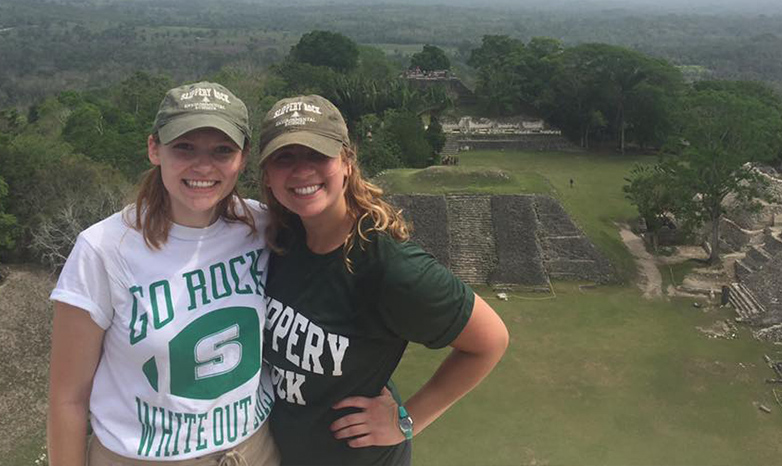SRU honors students take part in State System study abroad trip to Belize

Slippery Rock University honors students Clare Clark and Ellie Schiappa tour the Mayan temple El Castillo in Mexico. Clark and Schiappa were part of a group of 24 honors program students from Pennsylvania’s State System of Higher Education schools who studied abroad in Belize, May 29-June 12.
July 19, 2017
SLIPPERY ROCK, Pa. - Belize is a tiny country that's difficult to find on a map, let alone analyze the sustainability of its ecotourism or the globalization of its agriculture. But that's exactly what two students from Slippery Rock University's honors program did as part of a study abroad trip funded through Pennsylvania's State System of Higher Education and organized by Mansfield University.
Clare Clark, a junior environmental science major from Brookville, and Ellie Schiappa, a junior geography, environmental studies and sustainability major from Grove City, represented SRU as two of 24 honors program students from 12 of the 14 State System schools. The group, which also included Mansfield University political science professors Jeff Bosworth and Jonathan Rothermel, visited the Central American country of Belize, May 29-June 12.
"I learned a lot about Belize, about myself, about different parts of the world and different cultures," Schiappa said. "That was really exciting for both of us."
Each year, one of the State System schools hosts an honors program study abroad trip. Committees from each school select two students from their school to participate in the program. Students earn six credits as part of an interdisciplinary course that includes four days of research at the host institution to familiarize them with the country; two weeks abroad where they talk with civic leaders, business owners and other community representatives; and a paper written about a topic affecting the country that is relevant to the students' major.
"It meant a lot to me because there were so many intelligent minds that were also being interviewed for this," said Clark, who was one of six SRU honors students that applied for the program. "Because of this opportunity I was able to broaden my horizons and learn new things and I feel as though my mind is a lot more open."
Clark's research focused on the sustainability of Belize's agricultural industries, such as sugar and oranges, in response to pressure from global markets. Many of the factories in Belize, a country the size of Massachusetts that boarders Mexico and the Caribbean Sea, are placed too close to rivers, which adversely affects the environment.
According to Clark, she was able "to see the global world through the eyes of a Belizean," which helped her better understand the ecosystem, biodiversity and how Belize fits into the larger picture.
"Those are keywords that people use all the time but you never get to actually immerse yourself in them," Clark said. "To do that was amazing and I'm very grateful."
Schiappa's paper centered on tourism, particularly the sustainability of ecotourism, which is tourism directed toward natural environments. For example, Belize has the second largest coral reef in the world and increased tourist activity such as snorkeling could damage the environment and make it less attractive and less profitable.
Learning from political science professors and interviewing local politicians enhanced Schiappa's understanding of the country, which is English-speaking with a population of nearly 390,000.
"We were able to talk to people about the problems with a more educated (approach)," Schiappa said. "I probably know more about Belize than I know about the U.S. political system."
Both Schiappa and Clark emphasized the poverty in Belize and how much the pair takes for granted in the U.S. including public education, air conditioning and running water.
"It was a humbling experience to be able to have contact with a country that is impoverished and developing," Schiappa said. "It's very eye-opening to know what we have (in America) and what we take for granted every day. That was biggest thing I brought away."
Clark spoke to a nurse named Raquel in Mahogany Heights, a depressed community of about 2,000 people. Raquel was running a lunch box program for malnourished children with food that cost about $4 (U.S.) per meal.
"Our professors wanted us to understand what poverty really means," Clark said. "It was hard to see but it was a point of inspiration for a lot of students to see poverty at a level like that."
In addition to their papers related to their majors, students also wrote service project papers with ideas to alleviate poverty. By talking to community members, Clark learned that many young adults wanted to start an apiary, or a honeybee farm, so she authored a paper that detailed ways in which the group could start a business with a sustainable source of income.
"There's never any easy solution," said Clark, who hopes to return to Central America, join the Peace Corps and eventually pursue a master's degree in a field related to environmental communication. "Overall it was an amazing experience. I've learned so much from it and I've gained so many new interests."
MEDIA CONTACT: Justin Zackal | 724.738.4854 | justin.zackal@sru.edu

